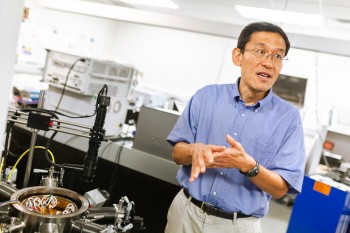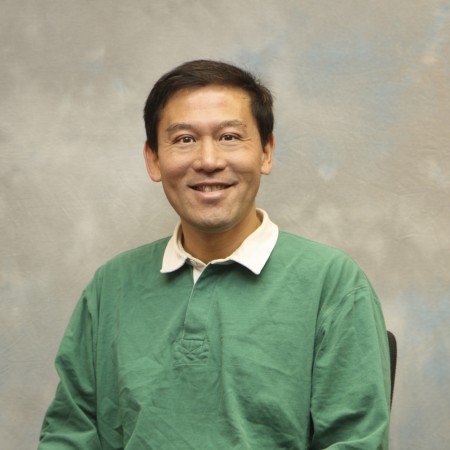Ph.D. - Applied Physics
Stanford University - 1991
Professional Preparation
A.B. - Physics
Harvard University - 1986
Harvard University - 1986
M.S. - Applied Physics
Harvard University - 1986
Harvard University - 1986
Research Areas
Research Interests
My research area is experimental solid-state physics, materials physics, and electronic and photonics device physics. I am interested in quantum effects in novel materials, nanomaterials, and devices, especially the response to microwave through terahertz electromagnetic fields. In my lab we measure basic linear electrodynamic properties, such as AC conductance and dielectric function, as well as non-linear response such as frequency conversion, from MHz to THz and at cryogenic temperatures and high magnetic fields.Publications
B. L. Brown, Mark Lee, P. G. Clem, C. D. Nordquist, T. S. Jordan, S. L. Wolfley, D. Leonhardt, C.
Edney, J. A. Custer, Electrical and Optical Characterization of the Metal-Insulator Transition
Temperature in Cr-doped VO2 Thin Films, submitted to J. Appl. Phys. (2012) 2012 - Publication
M. C. Wanke, A. D. Grine, C. T. Fuller, C. D. Nordquist, M. J. Cich, J. L. Reno, Mark Lee, Common
mode frequency instability in internally phase-locked terahertz quantum cascade lasers, Optics Express
19, 24810 (2011) 2011 - Publication
B. L. Brown, Mark Lee, P. G. Clem, C. D. Nordquist, T. S. Jordan, S. L. Wolfley, D. Leonhardt, C.
Edney, J. A. Custer, Electrical and Optical Characterization of the Metal-Insulator Transition
Temperature in Cr-doped VO2 Thin Films, submitted to J. Appl. Phys. (2012) 2011 - Publication
M.C. Wanke, Mark Lee, C. D. Nordquist, M. J. Cich, M. Cavaliere, A. M. Rowen, J. R. Gillen, C. L.
Arrington, A. D. Grine, C. T. Fuller, J. L. Reno, Integrated Chip-Scale THz Technology, Micro-Nanotech
Sensors Syst. 8031, 80310E (2011) 2011 - Publication
M. C. Wanke, E. W. Young, C. D. Nordquist, M. J. Cich, A. D. Grine, C. T. Fuller, J. Wendt, J. L.
Reno, Mark Lee, Monolithically integrated solid-state terahertz transceivers, Nature Photonics 4, 565
(2010) 2010 - Publication
D. A. Scrymgeour, C. Highstrete, Y.-J. Lee, J. W. P. Hsu, Mark Lee, High frequency impedance
spectroscopy on ZnO nanorod arrays, J. Appl. Phys. 107, 064312 (2010) 2010 - Publication
C. Highstrete, Mark Lee, A. A. Talin, A. L. Vance. Microwave conductance spectra of single-walled
carbon nanotube arrays, Appl. Phys. Lett. 95, 203111 (2009) 2009 - Publication
M. C. Wanke, C. D. Norquist, M. J. Cich, A. M. Rowen, C. L. Arrington, Mark Lee, A. D. Grine, C.
T. Fuller, E. W. Young, Terahertz quantum cascade laser integration with on-chip micromachined
rectangular waveguides, to be published in Proc. SPIE Photonics West (2009) 2009 - Publication
Appointments
Professor
University of Texas at Dallas [2010–Present]
University of Texas at Dallas [2010–Present]
Research Professor
University of Texas of Dallas [2010–Present]
University of Texas of Dallas [2010–Present]
Manager
Sandia National Laboratories [2003–2010]
Sandia National Laboratories [2003–2010]
Principal Member of Technical Staff
Sandia National Laboratories [2003–2010]
Sandia National Laboratories [2003–2010]
Member of Technical Staff
Lucent Technologies [1999–2003]
Lucent Technologies [1999–2003]
Associate Professor
University of Virginia [1997–2001]
University of Virginia [1997–2001]
Assistant Professor
University of Virginia [1992–1997]
University of Virginia [1992–1997]
Post-Doctoral Research Scientist
NEC Research Institute [1991–1992]
NEC Research Institute [1991–1992]
Projects
Terahertz detection using high-mobility GaAs-AlGaAs heterostructures
2018–2018 Materials Research Society Spring Meeting, San Francisco, CA, April 2006Advances in integrated terahertz microelectronics
2018–2018 SPIE Optics East, Boston, MA, October 2006Terahertz microelectronics: new components and applications
2018–2018 SURA Symposium on THz Applications, Washington, DC, June 2006Operation of a monolithic planar Schottky receiver using a THz quantum cascade laser
2018–2018 SPIE Optics East, Boston, MA, September 2007Solid-state microelectronics for the terahertz spectrum
2018–2018 American Institute of Engineering Conference on THz Systems III, San Diego, CA, November 2005Additional Information
Awards, Recognition, and Professional Leadership
- 2009 Chair, George E. Pake Prize Committee, American Physical Society
- 2008 Chair, Forum on Industrial & Applied Physics (FIAP), American Physical Society
- 2007 Chair-Elect, Forum on Industrial & Applied Physics (FIAP), American Physical Society
- 2006 Vice-Chair, Forum on Industrial & Applied Physics (FIAP), American Physical Society
- 2005 Fellow of the American Physical Society
- 2005 Sandia Research Recognition Award for Terahertz Plasmon Detectors
- 1996 National Science Foundation Young Investigator Career Award
- 1996 Research Corporation Cottrell Scholars Faculty Award
- 1986 National Science Foundation Graduate Fellowship
- 1985 Phi Beta Kappa
Patents
- Mark Lee, S. A. Solin, P. A. Wolff, A magnetoresistor using a superlattice of GaAs and AlGaAs, United States patent no. 5189367 (1993)
- R. W. Barton, K. Char, R. H. Hammond, A. Kapitulnik, S. S. Laderman, Mark Lee, A. F. Marshall, High temperature superconductor Y2Ba4Cu8O20-x, United States patent no. 5217947 (1993)
- B. S. Deaver, J. W. P. Hsu, Mark Lee, Nanometer distance regulation using electromechanical power dissipation, United States patent no. 5886532 (1999)
- Mark Lee, L. N. Pfeiffer, K. W. West, Velocity cooled bolometric mixer/detector, United States patent no. 6661039 (2004)
- C. G. Erben, D. M. Gill, H. E. Katz, Mark Lee, High efficiency optical amplitude and phase modulators using polymer materials, United States patent no. 6819808 (2004)
- S. J. Allen, Mark Lee, M. C. Wanke, Terahertz radiation mixer, United States patent no. 7376403 (2008)
- S. J. Allen, Mark Lee, E. A. Shaner, M. C. Wanke, Direct detector for terahertz radiation, United States patent no. 7420225 (2008)
- Mark Lee, M. C. Wanke, Integrated heterodyne terahertz transceiver, United States patent no. 7550734 (2009)
- R. D. Averitt, H.-T. Chen, Mark Lee, J. F. O’Hara, W. J. Padilla, Active terahertz metamaterial devices, United States patent no. 7826504 (2010)
- M. J. Cich, Mark Lee, C. D. Nordquist, M. C. Wanke, Integrated heterodyne terahertz transceiver,United States patent no. 8274058 (2012)
Teaching and Research Supervision
Courses Taught at the University of Texas Dallas:- Physics 4352, Concepts of Modern Physics
- Fall 2012 [composite average student evaluation 4.8/5.0]
- Physics 4311, Thermodynamics & Statistical Mechanics
- Spring 2011 [composite average student evaluation 4.5/5.0]
- Spring 2012 [composite average student evaluation 4.8/5.0]
- Physics 3341, Physics for Bio Science I
- Fall 2011 [composite average student evaluation 4.4/5.0]
- Physics 151, Introductory Physics I (one semester, student evaluation: A+)
- Physics 152, Introductory Physics II (three semesters, student evaluations: A, A+, A+)
- Physics 519, Electronics Laboratory (three semesters, student evaluations: A+, A+, A)
- Physics 861, Solid State Physics I (three semesters, student evaluations: A, A, A+)
- Six undergraduate research students have worked with me at U.Va. and UTD.
- Six graduate students have earned their Ph.D. with me at U.Va., Bell Labs, and Sandia.
- Two graduate students are currently pursuing their Ph.D. with me at UTD.
- Two post-docs have worked with me at Sandia.
News Articles
Physicists Create Tiny Thermoelectric Generators with Plenty of Power
 Electronic sensors can report data from a variety of remote locations as long as they have power. The challenge is providing safe, reliable power when there’s no wall plug, no light for solar panels and no access to replace a battery.
Electronic sensors can report data from a variety of remote locations as long as they have power. The challenge is providing safe, reliable power when there’s no wall plug, no light for solar panels and no access to replace a battery.Researchers at The University of Texas at Dallas, in partnership with Texas Instruments, are using a combination of silicon and germanium in a way that harnesses waste heat to provide enough power to run commercial electronic devices.
In a study published Aug. 31 in Nature Communications, they show that their tiny thermoelectric generators can provide a practical, cost-effective and mass-producible solution for producing power from only a relatively small difference in temperature.
